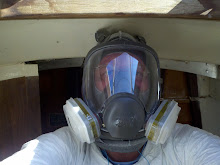What? Yes! This somewhat abstract idea is especially true for a boat that will be lived in and depended upon to cross bodies of water of any size. This idea may even explain why we, the lovers of boats, give them names. If a sailor finds himself in trouble he may call for a rescue. Before they do though, if they are a true sailor, they will talk to their ship, give it encouragement and trust it as if it were their mother. If this fails they might call to their God or Neptune to give the vessel guidance and strength before sending an SOS.
What I am really talking about though are the complexities of a sailboat. There are so many things interconnected above and below decks that influence an ever expanding matrix that might be compared to a human body. If your neck is sore or your hip has a pinched nerve, it can affect your feet. A sailboat has the same sort of nervous system. If something is not right at the masthead it can cause problems elsewhere that could sink it. Just as a person needs to take care of their body, a sailor needs to take care of their boat.
That is where it really gets complicated. A boat designed to cross oceans and sustain people while on the trip is complex. Even in a simple boat without refrigeration, electronics or a shower! Some sailors will go to great lengths to make their boats nearly alive with systems that make life aboard easier and in doing so compromises their own safety. Some will do the opposite yet neglect to address the integrity of the vessel and sail in to the sunset with no idea that their ballast or rudder is about to fall off.
A sailor is the heart of a sailboat and the sails are the wings. The little things like an misaligned prop shaft or rotten core beneath a cleat can test that connection between man and ship. A sailor that takes care of his vessel and knows it's capabilities versus one that does not will go farther and be much safer. This is what makes sailboats living beings, the sailor.

No comments:
Post a Comment